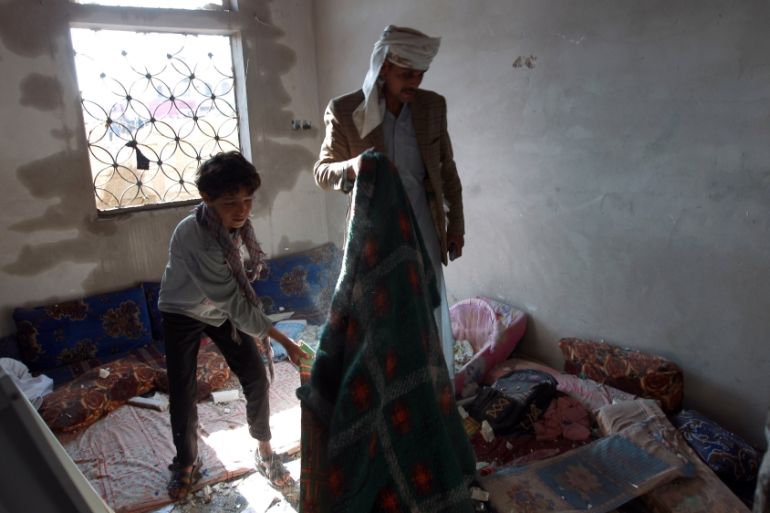Yemen’s children: ‘When can I go out and play again?’
Young children are being traumatised by the conflict in their country, experts say, as air strikes continue.

Correction: A previous version of this article included a picture from a bomb attack on December 4, 2014 – months before the start of the air strikes.
Among piles of rubble and strewn personal belongings in a residential area outside of Sanaa’s international airport, two young children lay injured and unconscious.
Keep reading
list of 4 itemsAre settler politics running unchecked in Israel?
Post-1948 order ‘at risk of decimation’ amid war in Gaza, Ukraine: Amnesty
UK passes bill to deport asylum seekers to Rwanda: What’s next?
Mariam and Zain al-Jumozee, eight and five years old, suffered cuts from glass windows that shattered during Saudi-led air strikes against the Houthi rebels last week. When they finally woke at the Saudi German Hospital in Hadda, the siblings instantly knew their parents had died. Unable to communicate, covered in plaster and stitches, they remained silent as gunfire continued to pummel the Yemeni capital.
The Saudi-led offensive, aimed at quelling the rise of Yemen’s Houthi rebels, has resulted in hundreds of civilian casualties, with more than 60 children among the dead, according to aid agency UNICEF. Scores of others have been injured.
“Children are in desperate need of protection, and all parties to the conflict should do all in their power to keep children safe,” UNICEF’s representative for Yemen, Julien Harneis, told Al Jazeera.
RELATED: UN says Yemen ‘on verge of total collapse’
Abdul Hafid Thwaba, the doctor who treated the Jumozee siblings, said their mental scars were far more significant than their physical injuries. “Seven people were injured [in the strike], of which two were children. Three others were unable to survive and died instantly.”
With missiles raining down every day, meanwhile, children who have escaped injury said they have been dealing with a new reality.
|
|
| Business in Sanaa crippled by conflict |
Five-year-old Suha Salem, dressed in a pink dress with short black hair and curious eyes, played a game of hopscotch inside her house. She would usually play outside with friends in the afternoon, but for the past week, she has not gone to school or met her friends.
Suha’s mother tried to comfort her by explaining that the loud sounds were “Revolution Day” celebrations, as they watched the gunfire together from their terrace. But Suha – who has little understanding of the conflict – was still able to pick up on the tension in the air, she told Al Jazeera.
“Children in particular are unable to process what they have seen,” Fred Abrahams, a special adviser with the children’s rights division of Human Rights Watch, told Al Jazeera. “In many conflicts we see the impact of this on kids: sleeplessness, separation anxiety, bed-wetting. Later this can develop into anxiety disorders, depression, and of course the use of violence.”
Al-Zumoriya street in Old Sanaa – once filled with the sounds of children running around after school, playing football, eating falafel and singing in the streets – is now a deserted, empty space.
Eight-year-old Islam Sanabani says that when he is scared, he looks for his grandfather. “He gives me a hug and then I feel better,” Islam told Al Jazeera from inside his residence in the al-Talha district. “He tells me the strikes will go away, but until now, they haven’t. In fact, they just get louder and louder.”
Socially cut off from seeing his friends, Sanabani instead takes a short, five-minute walk to a nearby shop to buy a treat for the day. Aware of the Saudi planes attacking Sanaa, Sanabani says he hopes for a miracle that would bring an end to the air strikes. “I haven‘t been to school in a week now,” he said.
Apart from tents and food, it's better to train and assist local service providers who can help children.
According to Abrahams, the situation not only impacts on children’s right to an education, but it also “deprives them of the stability and social interaction of the classroom. Clearly this will harm them in the future if they are not properly educated and unable to find jobs.“
ANALYSIS: Yemen needs hope not bombs
In addition to army camps and military bases, several civilian areas have been hit in the air strikes. The bustling Bab-al-Yemen bus stop outside the old city, surrounded by stores selling Yemeni swords and fresh fruits, was hit on Monday.
That same day, the northern al-Mazraq camp near Saada, which houses many displaced women and children, was hit. A doctor at the Haradh hospital who spoke on condition of anonymity said 25 people were killed and 30 injured. Other reports indicated the numbers could be higher.
Another 40 people died in an air strike on a factory complex near the Red Sea port of Hodeida on Tuesday night – and with the civilian death toll mounting, the country’s health system has come under pressure.
Sami Youssef, who is seven years old and lives near the Faj Attan mountains, says he has been consoling his pregnant mother, who is anxious about the baby’s arrival next month. She says, “come hug me, don’t leave me alone”, Sami told Al Jazeera.
Chocolate and freedom of movement have become a luxury for Sami. His uncle sometimes brings him chocolate from the store, but unlike before, he cannot wander the neighbourhood freely.
While aid agencies are doing their best to help Yemen’s children of war, Abrahams said a greater emphasis should be put on psychosocial support. “Apart from tents and food, it’s better to train and assist local service providers who can help children. But in places like Yemen, it can be difficult to identify and support those people,” he said.
Suha, meanwhile, clutches her favourite doll and stares despondently ahead. “When will this end?” she asks. “When can I go out and play again?“